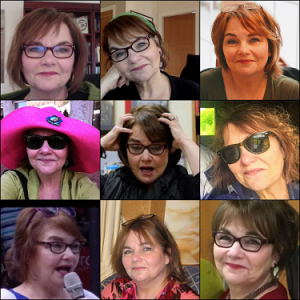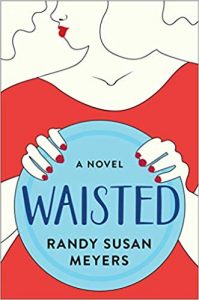Why My Novels are Filled with My Food Obsession and How Writing ‘Waisted’ Changed My Life
 I grew up in a family where food was considered the comforting evil or evil comfort—but never just comfort. Never just food. My mother—for whom dress size was the holy grail—watched every bite I took. When in a restaurant, first she’d not order what she wanted and then she’d steal bites from my plate. If I protested, she’d say “If you love me, you’ll share your food.”
I grew up in a family where food was considered the comforting evil or evil comfort—but never just comfort. Never just food. My mother—for whom dress size was the holy grail—watched every bite I took. When in a restaurant, first she’d not order what she wanted and then she’d steal bites from my plate. If I protested, she’d say “If you love me, you’ll share your food.”
Meals were haphazard at best. Often, we barely had food in the house. My sister snacked on raw Kraft Macaroni & Cheese. I ate uncooked matzo meal. We both lived on cold cereal—which to this day is my top comfort food.
Crispy salmon infused with spicy mango, Thai spring rolls crunching in her mouth—for the first time in months, Phoebe didn’t eat like an animal crouched over her kill. —The Widow of Wall Street
My mother hid cookies and cake inside our giant pressure cooker and then put the pot on the very top of our already high cabinets. My sister and I were under ten, but a pressure cooker was no match for us. I’m surprised we didn’t become mountain climbers for how often we scampered up the peaks leading to buried sweets.
My agent once told me that she could barely make it through one of my manuscripts without bingeing. Passion shines through any writing, I suppose, and I have a serious love-hate relationship with food.
Seeing the relationships characters have with food shines a light on who they are.
Thanksgiving reminded me of Duffy, the orphanage, where canned cranberry sauce sat upright in chipped bowls, the can markings visible on the red towers. The only girls who ever ate the tinny-tart stuff were the girls so fat, so desperately trying to fill themselves, they’d lick the can if allowed. Scraping our plates clean of the thin servings of turkey and watery mashed potatoes, we looked only at our food, as though ashamed to be seen celebrating in such poor company. —The Murderer’s Daughters
Food is consolation and culture, pleasure and punishment. Food is art & it is craft. Food, along with touch, is our first experience with being cared for by another.
Hunger is terrifying. Food can be torture.
My always-thin mother lived for leanness and beauty. My sister’s body mirrored hers. To the day my mother died, she’d ask, “how’s your weight” each time we spoke, as though my ‘weight’ was a living-breathing entity separate from that which she liked about me. Not surprisingly, this dynamic skewed my body image. This, along with my mother’s penchant for withholding/hiding/shaming around food—or, more simply, just not having any in the house, led—no surprise— to an obsession with food. To this day, my sister and I eat faster than anyone we know. Eating with us cannot be fun.
Supper should have tasted like ashes that night, but instead compliments flew as Nathan and her sons forked up buttered noodles, beef chunks, and carrots so tender from wine and time, you’d think they’d been cooked with love. —The Comfort of Lies
 Writing my new novel, WAISTED (about seven weight-obsessed women chosen for a documentary about women and their bodies—an endeavor promising to heal— find themselves locked down at a hardcore reality show run by punishing fat shaming filmmakers) was freeing or horrifying depending on the day and my mood.
Writing my new novel, WAISTED (about seven weight-obsessed women chosen for a documentary about women and their bodies—an endeavor promising to heal— find themselves locked down at a hardcore reality show run by punishing fat shaming filmmakers) was freeing or horrifying depending on the day and my mood.
I wanted to never eat again or never stop eating. I’d vowed to be totally honest to what I knew to be true.
Sometimes my truth will not match other people’s experience, and sometimes it will, but writing down to the bone about food obsession, and dress size preoccupation, though it often left me raw, ultimately became a triumph for me.
Trying to spread cold peanut butter made her hate Ben’s mother. Frances had spent the past forty-six years appeasing Ben’s father’s neuroses by keeping a spotless house and refrigerating peanut butter, on constant guard against food poisoning, bacteria, and dust. Because of Frances, they ate hard peanut butter. —Accidents of Marriage
Letting my subliminal thoughts about food leak onto the page was an extraordinary experience. Before I wrote about my character’s feelings about butter vs. oil, guilt, unconscious eating, sneak eating and the dynamics of preparing, serving, and sharing a meal, I’d not realized I was so twisted. I learned, even more than I already knew, how food and weight determined my life.
She reached into her bottom drawer and got out the giant bag of M&M’s she stashed under a pile of unused files and stuffed them into her mouth. Overly sweet chocolate pasted her tongue, while the gritty bits of shell wedged like shrapnel between her teeth. Machinelike, she scooped out the candy, shoved in the pieces, masticated, and began again, hardly waiting to swallow, as her full hand stood ready like an eager soldier, prepared to send the next wave of reinforcements to their deaths. —Waisted
At times, I had to push through the manuscript. But in the end, it changed me. Writing WAISTED, letting in the body/food neurosis lurking everywhere I turned, I found a way to cope with my food crazies. By facing it dead on, I found a path towards some semblance of day-to-day calmness. The (admittedly rigid and odd) survival process I generated might not work for most people—maybe not even a small slice—but it works for me.
For now.
Sort of.
—
Randy Susan Meyers is the bestselling author of Waisted, Accidents of Marriage, The Comfort of Lies, The Murderer’s Daughters, and The Widow of Wall Street. Her books have twice been finalists for the Mass Book Award and named “Must Read Books” by the Massachusetts Center for the Book. She lives with her husband in Boston, where she teaches writing at the Grub Street Writers’ Center.
WAISTED
 In this provocative, wildly entertaining, and compelling novel, seven women enrolled in an extreme weight loss documentary discover self-love and sisterhood as they enact a daring revenge against the exploitative filmmakers.
In this provocative, wildly entertaining, and compelling novel, seven women enrolled in an extreme weight loss documentary discover self-love and sisterhood as they enact a daring revenge against the exploitative filmmakers.
Alice and Daphne, both successful and accomplished working mothers, harbor the same secret: obsession with their weight overshadows concerns about their children, husbands, work—and everything else of importance in their lives. Scales terrify them.
Daphne, plump in a family of model-thin women, learned only slimness earns admiration at her mother’s knee. Alice, break-up skinny when she met her husband, risks losing her marriage if she keeps gaining weight.
The two women meet at Waisted. Located in a remote Vermont mansion, the program promises fast, dramatic weight loss, and Alice, Daphne, and five other women are desperate enough to leave behind their families for this once-in-a-lifetime opportunity. The catch? They must agree to always be on camera; afterward, the world will see Waisted: The Documentary.
The women soon discover that the filmmakers have trapped them in a cruel experiment. With each pound lost, they edge deeper into obsession and instability…until they decide to take matters into their own hands.
Category: On Writing

























